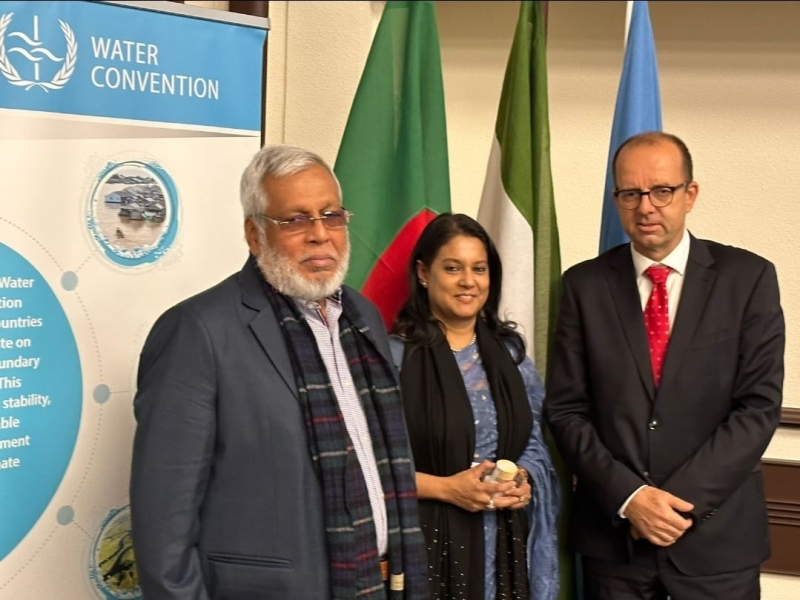- Garbage pile turns Companiganj Bazar into an unhygienic town |
- Put 'old feuds' aside for a new era of harmony in ME: Trump |
- Rivers are Bangladesh's lifeblood, Rizwana at UN Water Convention |
- UN Releases $11 Million for Gaza Aid Amid Fragile Hope |
- Global ‘Food Heroes’ Driving Change From Farm to Table |
Rivers are Bangladesh's lifeblood, Rizwana at UN Water Convention
She calls for equitable water sharing and transboundary cooperation

Rizwana Hasan, Adviser for Environment and Water Resources at the UN Water Convention on Monday. UNB
Dhaka, Oct 13 -- Highlighting the country’s deep-rooted connection with rivers, Environment Adviser Syeda Rizwana Hasan said “for Bangladesh, rivers are not just rivers – they are our lifeblood.”
She also called for equitable and cooperative management of shared water resources while addressing the 1st Session of the 6th Joint Meeting of the Working Groups on Integrated Water Resources Management and Monitoring & Assessment of the UN Water Convention, held in Switzerland’s Geneva on Monday.
Bangladesh, she noted, is the world’s largest river delta—formed by the Ganges-Padma, Brahmaputra-Jamuna, and Surma-Meghna basins—with over 90 percent of its surface water originating from beyond its borders.
As a lower riparian country, Bangladesh strongly advocates for the principles of equitable and reasonable utilization, participation, and no harm in managing transboundary rivers.
She informed the session that Bangladesh has made significant progress through bilateral treaties and the establishment of the Joint Rivers Commission, but emphasized that achieving basinwide regional cooperation remains a key policy goal.
The Adviser also referred to Bangladesh’s landmark Supreme Court judgment recognizing all rivers as “living entities” with legal personhood, a global example of environmental jurisprudence.
Discussing domestic challenges, Rizwana Hasan pointed out that Bangladesh faces resource and institutional constraints in implementing its comprehensive river protection laws. She said the country is focusing on strengthening institutional capacity, improving data and monitoring systems, and combating pollution, salinity intrusion, and reduced river flows.
The Adviser also mentioned that Bangladesh is conducting nationwide groundwater assessments, identifying two water-stressed zones, and preparing rainwater harvesting schemes for salinity-affected coastal regions to ensure potable water supply.
She reiterated that transboundary cooperation is “indispensable” for Bangladesh’s survival and expressed hope that joining the UN Water Convention will enable stronger partnerships for regional water security.
“Bangladesh’s accession as the first South Asian country to the UN Water Convention will facilitate constructive engagement towards sustainable water futures for the South Asian region,” she stated.
Syeda Rizwana Hasan reaffirmed Bangladesh’s commitment to sustainable and inclusive water governance, climate resilience, and international cooperation, calling for collective action to uphold the principles of equity, sustainability, and justice in global water management.
Adviser Muhammad Fouzul Kabir Khan also present on the occasion. - UNB

